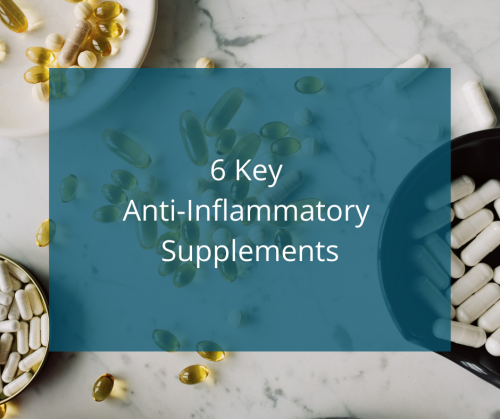**See below to purchase supplements
Fish oil
The first supplement I go to lower inflammation is fish oil (aka omega-3 essential fatty acids) which helps to lower levels of inflammation. The word ‘essential’ means you have to get it from food or supplements, our bodies do not make them. Eating good quality, ethically sourced fish and seafood is a good idea, but difficult to get enough omega 3’s to combat inflammation, so supplementing a good quality fish oil (or algae oil for vegetarians) is the way to go.
Turmeric/curcumin
Turmeric has become a popular ingredient in products in the past few years thanks to its powerful anti-inflammatory properties. It’s definitely not a new spice since it’s been used for over 4000 years, and dates back to Indian culture originally. But recently, health experts and nutritionists have spotlighted turmeric for its powerful anti-inflammatory properties, which is why you can find it in just about every form—including as turmeric supplements.
Black pepper makes curcumin (a substance in turmeric) 2000% more absorbable, so if you’re cooking with turmeric make sure to add black pepper. If you decide to supplement curcumin or turmeric make sure that the supplement contains black pepper.
Alpha-lipoic acid (ALA)
Alpha-lipoic acid is a powerful antioxidant that provides a ton of health benefits, including the ability to help lower inflammation.
If you are concerned about inflammation, you can ask your doctor to check your inflammation levels with lab testing. They will likely run a CRP (C-reactive protein) test since it is one of the key ways to check out inflammation levels in your body.
ALA is effective at lowering key inflammatory markers in the blood like CRP levels.
Quercetin
Quercetin is a flavonoid that is found naturally in many fruits and vegetables that can help lower inflammation. It has been reported to be effective for treatment of SARS-like coronavirus infections and is being studied as a treatment for COVID-19.
It’s also helpful for people who suffer from allergies or chronic sinusitis.
Resveratrol
Resveratrol is a beneficial antioxidant found in food and yes, in red wine. It’s been shown to have anti-cancer effects, may help cardiovascular health and neurodegenerative disorders.
Resveratrol may be useful in suppressing SARS-CoV-2 replication and diminishing SARS-CoV-2-induced cytokine storms
N-Acetyl Cysteine
N-acetyl cysteine has been FDA approved for many years, it’s known to increase levels of the major antioxidant glutathione needed for the maintenance of good health. More recently it has been shown to have the potential to improve outcomes from COVID-19 by suppressing cytokine storm and increase T cell protection, thereby mitigating inflammation and tissue injury.
Please keep in mind that it’s a good idea to work with a qualified health care practitioner who can guide you in implementing specific changes in diet, lifestyle and supplementation that suit your body’s needs.
**To purchase professional grade supplements and save 15% check out my online dispensary…
Click ‘Protocols’ to see a list of my favourite anti-inflammatory supplements
References
https://www.health.harvard.edu/staying-healthy/do-fish-oil-supplements-reduce-inflammation#:~:text=A.,get%20them%20through%20your%20diet.
https://journal-inflammation.biomedcentral.com/articles/10.1186/s12950-021-00268-6
https://lpi.oregonstate.edu/mic/dietary-factors/lipoic-acid
https://www.ncbi.nlm.nih.gov/pmc/articles/PMC5241507/
https://www.ncbi.nlm.nih.gov/pmc/articles/PMC6802539/#:~:text=Resveratrol%20induces%20autophagy%20by%20inhibiting,AMPK%20and%20directly%20inhibit%20mTOR.
https://www.ncbi.nlm.nih.gov/pmc/articles/PMC7649937/


